第4届韩素音青年翻译比赛英译汉原文及参考译文
韩素音青翻译奖赛中文原文及参考译文和解析
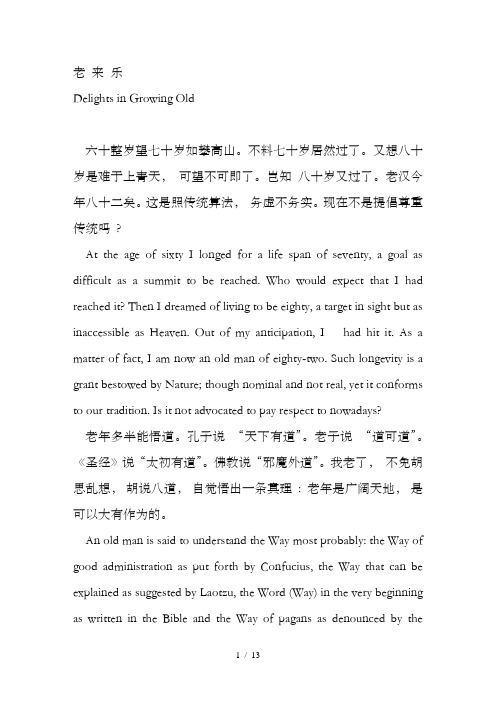
老来乐Delights in Growing Old六十整岁望七十岁如攀高山。
不料七十岁居然过了。
又想八十岁是难于上青天,可望不可即了。
岂知八十岁又过了。
老汉今年八十二矣。
这是照传统算法,务虚不务实。
现在不是提倡尊重传统吗?At the age of sixty I longed for a life span of seventy, a goal as difficult as a summit to be reached. Who would expect that I had reached it? Then I dreamed of living to be eighty, a target in sight but as inaccessible as Heaven. Out of my anticipation, I had hit it. As a matter of fact, I am now an old man of eighty-two. Such longevity is a grant bestowed by Nature; though nominal and not real, yet it conforms to our tradition. Is it not advocated to pay respect to nowadays?老年多半能悟道。
孔子说“天下有道”。
老子说“道可道”。
《圣经》说“太初有道”。
佛教说“邪魔外道”。
我老了,不免胡思乱想,胡说八道,自觉悟出一条真理: 老年是广阔天地,是可以大有作为的。
An old man is said to understand the Way most probably: the Way of good administration as put forth by Confucius, the Way that can be explained as suggested by Laotzu, the Word (Way) in the very beginning as written in the Bible and the Way of pagans as denounced by theBuddhists. As I am growing old, I can't help being given to flights of fancy and having my own Way of creating stories. However I have come to realize the truth: my old age serves as a vast world in which I can still have my talents employed fully and developed completely.七十岁开始可以诸事不做而拿退休金,不愁没有一碗饭吃,自由自在,自得其乐。
韩素音翻译比赛原文

Are We There Yet?America’s recovery will be much slower than that from most recessions; but the government can help a bit.“WHITHER goest thou, America?” That question, posed by Jack Kerouac on behalf of the Beat generation half a century ago, is the biggest uncertainty hanging over the world economy. And it reflects the foremost worry for American voters, who go to the polls for the congressional mid-term elections on November 2nd with the country’s unemployment rate stubbornly stuck at nearly one in ten. They should prepare themselves for a long, hard ride.The most wrenching recession since the 1930s ended a year ago. But the recovery—none too powerful to begin with—slowed sharply earlier this year. GDP grew by a feeble 1.6% at an annual pace in the second quarter, and seems to have been stuck somewhere similar since. The housing market slumped after temporary tax incentives to buy a home expired. So few private jobs were being created that unemployment looked more likely to rise than fall. Fears grew over the summer that if this deceleration continued, America’s economy would slip back into recession.Fortunately, those worries now seem exaggerated. Part of the weakness of second-quarter GDP was probably because of a temporary surge in imports from China. The latest statistics, from reasonably good retail sales in August to falling claims for unemployment benefits, point to an economy that, though still weak, is not slumping further. And history suggests that although nascent recoveries often wobble for a quarter or two, they rarely relapse into recession. For now, it is most likely that America’s economy will crawl along with growth at perhaps 2.5%: above stall speed, but far too slow to make much difference to the jobless rate.Why, given that America usually rebounds from recession, are the prospects so bleak? That’s because most past recessions have been caused by tight monetary policy. When policy is loosened, demand rebounds. This recession was the result of a financial crisis. Recoveries after financial crises are normally weak and slow as banking systems are repaired and balance-sheets rebuilt. Typically, this period of debt reduction lasts around seven years, which means America would emerge from it in 2014. By some measures, households are reducing their debt burdens unusually fast, but even optimistic seers do not think the process is much more than half over.Battling on the busAmerica’s biggest problem is that its politician s have yet to acknowledge that the economy is in for such a long, slow haul, let alone prepare for the consequences. A few brave officials are beginning to sound warnings that the jobless rate is likely to “stay high”. But the political debate is more abou t assigning blame for the recession than about suggesting imaginative ways to give more oomph to the recovery.Republicans argue that Barack Obama’s shift towards “big government” explains the economy’s weakness, and that high unemployment is proof that fiscal stimulus was a bad idea. In fact, most of the growth in government to date has been temporary and unavoidable; the longer-run growth in government is more modest, and reflects the policies of both Mr Obama and his predecessor. And the notion that hig h joblessness “proves” that stimulus failed is simply wrong. The mechanics of a financial bust suggest that without a fiscal boost the recession would have been much worse. Democrats have their own class-warfare version of the blame game, in which Wall Str eet’s excesses caused the problem and higher taxes on high-earners are part of the solution. That is why Mr. Obama’s legislative priority before the mid-terms is to ensure thatthe Bush tax cuts expire at the end of this year for households earning more than $250,000 but are extended for everyone else. This takes an unnecessary risk with the short-term recovery. America’s experience in 1937 and Japan’s in 1997 are powerful evidence that ill-timed tax rises can tip weak economies back into recession. Higher taxes at the top, along with the waning of fiscal stimulus and belt-tightening by the states, will make a weak growth rate weaker still. Less noticed is that Mr. Obama’s fiscal plan will also worsen the medium-term budget mess, by making tax cuts for the middle class permanent.Ways to overhaul the engineIn an ideal world America would commit itself now to the medium-term tax reforms and spending cuts needed to get a grip on the budget, while leaving room to keep fiscal policy loose for the moment. But in febrile, partisan Washington that is a pipe-dream. Today’s goals can only be more modest: to nurture the weak economy, minimize uncertainty and prepare the ground for tomorrow’s fiscal debate. To that end, Congress ought to extend all the Bush tax cuts until 2013. Then they should all expire—prompting a serious fiscal overhaul, at a time when the economy is stronger.A broader set of policies could help to work off the hangover faster. One priority is to encourage more write-downs of mortgage debt. Almost a quarter of all Americans with mortgages owe more than their houses are worth. Until that changes the vicious cycle of rising foreclosures and falling prices will continue. There are plenty of ideas on offer, from changing the bankruptcy law so that judges can restructure mortgage debt to empowering special trustees to write down loans. They all have drawbacks, but a fetid pool of underwater mortgages will, much like Japan’s loans to zombie firms, corrode the financial system and harm the recoverCleaning up the housing market would help cut America’s unemployment rate, by making it easier for people to move to where jobs are. But more must be done to stop high joblessness becoming entrenched. Payroll-tax cuts and credits to reduce the cost of hiring would help. (The health-care reform, alas, does the opposite, at least for small businesses.) Politicians will also have to think harder about training schemes, because some workers lack the skills that new jobs require.Americans are used to great distances. The sooner they, and their politicians, accept that the road to recovery will be a long one, the faster they will get there.。
历届韩素音翻译大奖赛竞赛原文及译文
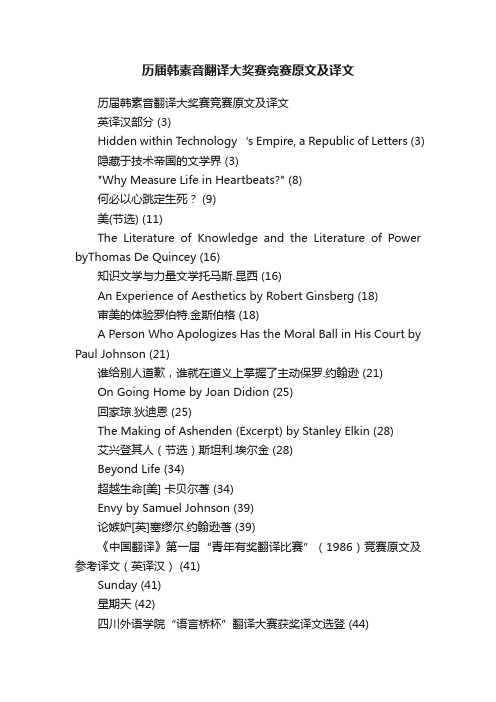
历届韩素音翻译大奖赛竞赛原文及译文历届韩素音翻译大奖赛竞赛原文及译文英译汉部分 (3)Hidden within Technology‘s Empire, a Republic of Letters (3)隐藏于技术帝国的文学界 (3)"Why Measure Life in Heartbeats?" (8)何必以心跳定生死? (9)美(节选) (11)The Literature of Knowledge and the Literature of Power byThomas De Quincey (16)知识文学与力量文学托马斯.昆西 (16)An Experience of Aesthetics by Robert Ginsberg (18)审美的体验罗伯特.金斯伯格 (18)A Person Who Apologizes Has the Moral Ball in His Court by Paul Johnson (21)谁给别人道歉,谁就在道义上掌握了主动保罗.约翰逊 (21)On Going Home by Joan Didion (25)回家琼.狄迪恩 (25)The Making of Ashenden (Excerpt) by Stanley Elkin (28)艾兴登其人(节选)斯坦利.埃尔金 (28)Beyond Life (34)超越生命[美] 卡贝尔著 (34)Envy by Samuel Johnson (39)论嫉妒[英]塞缪尔.约翰逊著 (39)《中国翻译》第一届“青年有奖翻译比赛”(1986)竞赛原文及参考译文(英译汉) (41)Sunday (41)星期天 (42)四川外语学院“语言桥杯”翻译大赛获奖译文选登 (44)第七届“语言桥杯”翻译大赛获奖译文选登 (44)The Woods: A Meditation (Excerpt) (46)林间心语(节选) (47)第六届“语言桥杯”翻译大赛获奖译文选登 (50)第五届“语言桥杯”翻译大赛原文及获奖译文选登 (52)第四届“语言桥杯”翻译大赛原文、参考译文及获奖译文选登 (54) When the Sun Stood Still (54)永恒夏日 (55)CASIO杯翻译竞赛原文及参考译文 (56)第三届竞赛原文及参考译文 (56)Here Is New York (excerpt) (56)这儿是纽约 (58)第四届翻译竞赛原文及参考译文 (61)Reservoir Frogs (Or Places Called Mama's) (61)水库青蛙(又题:妈妈餐馆) (62)中译英部分 (66)蜗居在巷陌的寻常幸福 (66)Simple Happiness of Dwelling in the Back Streets (66)在义与利之外 (69)Beyond Righteousness and Interests (69)读书苦乐杨绛 (72)The Bitter-Sweetness of Reading Yang Jiang (72)想起清华种种王佐良 (74)Reminiscences of Tsinghua Wang Zuoliang (74)歌德之人生启示宗白华 (76)What Goethe's Life Reveals by Zong Baihua (76)怀想那片青草地赵红波 (79)Yearning for That Piece of Green Meadow by Zhao Hongbo (79)可爱的南京 (82)Nanjing the Beloved City (82)霞冰心 (84)The Rosy Cloud byBingxin (84)黎明前的北平 (85)Predawn Peiping (85)老来乐金克木 (86)Delights in Growing Old by Jin Kemu (86)可贵的“他人意识” (89)Calling for an Awareness of Others (89)教孩子相信 (92)To Implant In Our Children‘s Young Hearts An Undying Faith In Humanity (92)心中有爱 (94)Love in Heart (94)英译汉部分Hidden within Technology’s Empire, a Republic of Le tters 隐藏于技术帝国的文学界索尔·贝娄(1)When I was a boy ―discovering literature‖, I used to think how wonderful it would be if every other person on the street were familiar with Proust and Joyce or T. E. Lawrence or Pasternak and Kafka. Later I learned how refractory to high culture the democratic masses were. Lincoln as a young frontiersman read Plutarch, Shakespeare and the Bible. But then he was Lincoln.我还是个“探索文学”的少年时,就经常在想:要是大街上人人都熟悉普鲁斯特和乔伊斯,熟悉T.E.劳伦斯,熟悉帕斯捷尔纳克和卡夫卡,该有多好啊!后来才知道,平民百姓对高雅文化有多排斥。
2020年第四届世界中医英语翻译大赛原文
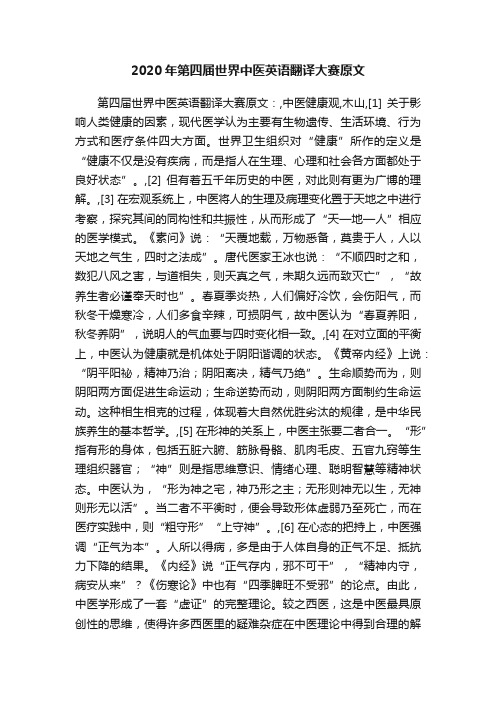
2020年第四届世界中医英语翻译大赛原文第四届世界中医英语翻译大赛原文:,中医健康观,木山,[1] 关于影响人类健康的因素,现代医学认为主要有生物遗传、生活环境、行为方式和医疗条件四大方面。
世界卫生组织对“健康”所作的定义是“健康不仅是没有疾病,而是指人在生理、心理和社会各方面都处于良好状态”。
,[2] 但有着五千年历史的中医,对此则有更为广博的理解。
,[3] 在宏观系统上,中医将人的生理及病理变化置于天地之中进行考察,探究其间的同构性和共振性,从而形成了“天—地—人”相应的医学模式。
《素问》说:“天覆地载,万物悉备,莫贵于人,人以天地之气生,四时之法成”。
唐代医家王冰也说:“不顺四时之和,数犯八风之害,与道相失,则天真之气,未期久远而致灭亡”,“故养生者必谨奉天时也”。
春夏季炎热,人们偏好冷饮,会伤阳气,而秋冬干燥寒冷,人们多食辛辣,可损阴气,故中医认为“春夏养阳,秋冬养阴”,说明人的气血要与四时变化相一致。
,[4] 在对立面的平衡上,中医认为健康就是机体处于阴阳谐调的状态。
《黄帝内经》上说:“阴平阳祕,精神乃治;阴阳离决,精气乃绝”。
生命顺势而为,则阴阳两方面促进生命运动;生命逆势而动,则阴阳两方面制约生命运动。
这种相生相克的过程,体现着大自然优胜劣汰的规律,是中华民族养生的基本哲学。
,[5] 在形神的关系上,中医主张要二者合一。
“形”指有形的身体,包括五脏六腑、筋脉骨骼、肌肉毛皮、五官九窍等生理组织器官;“神”则是指思维意识、情绪心理、聪明智慧等精神状态。
中医认为,“形为神之宅,神乃形之主;无形则神无以生,无神则形无以活”。
当二者不平衡时,便会导致形体虚弱乃至死亡,而在医疗实践中,则“粗守形”“上守神”。
,[6] 在心态的把持上,中医强调“正气为本”。
人所以得病,多是由于人体自身的正气不足、抵抗力下降的结果。
《内经》说“正气存内,邪不可干”,“精神内守,病安从来”?《伤寒论》中也有“四季脾旺不受邪”的论点。
2022韩素音国际翻译大赛(英译汉)二等奖译文
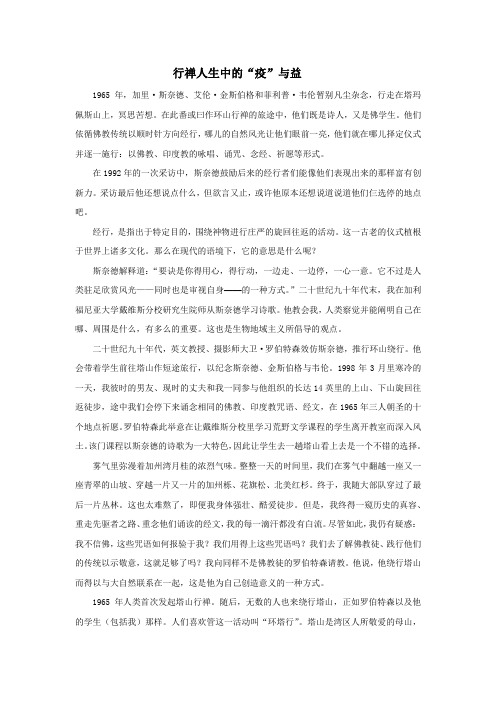
行禅人生中的“疫”与益1965年,加里·斯奈德、艾伦·金斯伯格和菲利普·韦伦暂别凡尘杂念,行走在塔玛佩斯山上,冥思苦想。
在此番或曰作环山行禅的旅途中,他们既是诗人,又是佛学生。
他们依循佛教传统以顺时针方向经行,哪儿的自然风光让他们眼前一亮,他们就在哪儿择定仪式并逐一施行:以佛教、印度教的咏唱、诵咒、念经、祈愿等形式。
在1992年的一次采访中,斯奈德鼓励后来的经行者们能像他们表现出来的那样富有创新力。
采访最后他还想说点什么,但欲言又止,或许他原本还想说道说道他们仨选停的地点吧。
经行,是指出于特定目的,围绕神物进行庄严的旋回往返的活动。
这一古老的仪式植根于世界上诸多文化。
那么在现代的语境下,它的意思是什么呢?斯奈德解释道:“要诀是你得用心,得行动,一边走、一边停,一心一意。
它不过是人类驻足欣赏风光——同时也是审视自身——的一种方式。
”二十世纪九十年代末,我在加利福尼亚大学戴维斯分校研究生院师从斯奈德学习诗歌。
他教会我,人类察觉并能阐明自己在哪、周围是什么,有多么的重要。
这也是生物地域主义所倡导的观点。
二十世纪九十年代,英文教授、摄影师大卫·罗伯特森效仿斯奈德,推行环山绕行。
他会带着学生前往塔山作短途旅行,以纪念斯奈德、金斯伯格与韦伦。
1998年3月里寒冷的一天,我彼时的男友、现时的丈夫和我一同参与他组织的长达14英里的上山、下山旋回往返徒步,途中我们会停下来诵念相同的佛教、印度教咒语、经文,在1965年三人朝圣的十个地点祈愿。
罗伯特森此举意在让戴维斯分校里学习荒野文学课程的学生离开教室而深入风土。
该门课程以斯奈德的诗歌为一大特色,因此让学生去一趟塔山看上去是一个不错的选择。
雾气里弥漫着加州湾月桂的浓烈气味。
整整一天的时间里,我们在雾气中翻越一座又一座青翠的山坡、穿越一片又一片的加州栎、花旗松、北美红杉。
终于,我随大部队穿过了最后一片丛林。
这也太难熬了,即便我身体强壮、酷爱徒步。
历届韩素音翻译大奖赛竞赛原文及译文
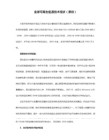
历届韩素音翻译大奖赛竞赛原文及译文英译汉部分 (3)Beauty (excerpt) (3)美(节选) (3)The Literature of Knowledge and the Literature of Power byThomas De Quincey (8)知识文学与力量文学托马斯.昆西 (8)An Experience of Aesthetics by Robert Ginsberg (11)审美的体验罗伯特.金斯伯格 (11)A Person Who Apologizes Has the Moral Ball in His Court by Paul Johnson (14)谁给别人道歉,谁就在道义上掌握了主动保罗.约翰逊 (14)On Going Home by Joan Didion (18)回家琼.狄迪恩 (18)The Making of Ashenden (Excerpt) by Stanley Elkin (22)艾兴登其人(节选)斯坦利.埃尔金 (22)Beyond Life (28)超越生命[美] 卡贝尔著 (28)Envy by Samuel Johnson (33)论嫉妒[英]塞缪尔.约翰逊著 (33)中译英部分 (37)在义与利之外 (37)Beyond Righteousness and Interests (37)读书苦乐杨绛 (40)The Bitter-Sweetness of Reading Yang Jiang (40)想起清华种种王佐良 (43)Reminiscences of Tsinghua Wang Zuoliang (43)歌德之人生启示宗白华 (45)What Goethe's Life Reveals by Zong Baihua (45)怀想那片青草地赵红波 (48)Yearning for That Piece of Green Meadow by Zhao Hongbo (48)可爱的南京 (51)Nanjing the Beloved City (51)霞冰心 (53)The Rosy Cloud byBingxin (53)黎明前的北平 (54)Predawn Peiping (54)老来乐金克木 (55)Delights in Growing Old by Jin Kemu (55)可贵的“他人意识” (58)Calling for an Awareness of Others (58)教孩子相信 (61)To Implant In Our Children’s Young Hearts An Undying Faith In Humanity (61)英译汉部分Beauty (excerpt)美(节选)Judging from the scientists I know, including Eva and Ruth, and those whom I've read about, you can't pursue the laws of nature very long without bumping撞倒; 冲撞into beauty. “I don't know if it's the same beauty you see in the sunset,”a friend tells me, “but it feels the same.”This friend is a physicist, who has spent a long career deciphering破译(密码), 辨认(潦草字迹) what must be happening in the interior of stars. He recalls for me this thrill on grasping for the first time Dirac's⑴equations describing quantum mechanics, or those of Einstein describing relativity. “They're so beautiful,” he says, “you can see immediately they have to be true. Or at least on the way toward truth.” I ask him what makes a theory beautiful, and he replies, “Si mplicity, symmetry .对称(性); 匀称, 整齐, elegance, and power.”我结识一些科学家(包括伊娃和露丝),也拜读过不少科学家的著作,从中我作出推断:人们在探求自然规律的旅途中,须臾便会与美不期而遇。
第四届语言桥杯翻译大赛参考译文及点评
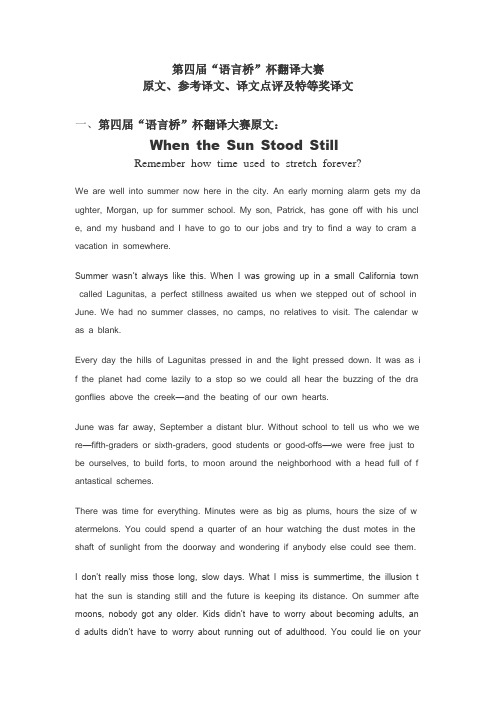
第四届“语言桥”杯翻译大赛原文、参考译文、译文点评及特等奖译文一、第四届“语言桥”杯翻译大赛原文:When the Sun Stood StillRemember how time used to stretch forever?We are well into summer now here in the city. An early morning alarm gets my da ughter, Morgan, up for summer school. My son, Patrick, has gone off with his uncl e, and my husband and I have to go to our jobs and try to find a way to cram a vacation in somewhere.Summer wasn’t always like this. When I was growing up in a small California town called Lagunitas, a perfect stillness awaited us when we stepped out of school in June. We had no summer classes, no camps, no relatives to visit. The calendar w as a blank.Every day the hills of Lagunitas pressed in and the light pressed down. It was as i f the planet had come lazily to a stop so we could all hear the buzzing of the dra gonflies above the creek—and the beating of our own hearts.June was far away, September a distant blur. Without school to tell us who we we re—fifth-graders or sixth-graders, good students or good-offs—we were free just to be ourselves, to build forts, to moon around the neighborhood with a head full of f antastical schemes.There was time for everything. Minutes were as big as plums, hours the size of w atermelons. You could spend a quarter of an hour watching the dust motes in the shaft of sunlight from the doorway and wondering if anybody else could see them.I don’t really miss those long, slow days. What I miss is summertime, the illusion t hat the sun is standing still and the future is keeping its distance. On summer afte rnoons, nobody got any older. Kids didn’t have to worry about becoming adults, an d adults didn’t have to worry about running out of adulthood. You could lie on yourback watching clouds scud across the sky, and maybe later walk down to the sto re for a Popsicle. You could lose your watch and not miss it for days.These busy kids I’m raising today don’t know what summertime is. They are on cit y time. “My life is going too fast,” Patrick once grumbled as he got into bed. “This whole day went by just like that. I didn’t have enough fun.”He’s a city child, a child whose fun is packed into short, hurried weekends. Even i n summer his hours grow shorter and begin to run together, faster and faster. It w on’t be long before an hour—once an eternity—is for him, too, a walk to the groce ry store, three phone calls, half a movie.Maybe that’s why we still need long school vacations—to anchor kids to the earth, keep them from rocketing too fast out of childhood.If they have enough time on their hands, they might be among the lucky ones who carry their summertime with them into adulthood.二、参考译文:夏日好时光可还记得以往时间像是永无止境地拉长了的?ADAIR LARA撰思果译夏天真正来到了我们居住的城市。
第四届“《英语世界》杯”翻译大赛比赛原文
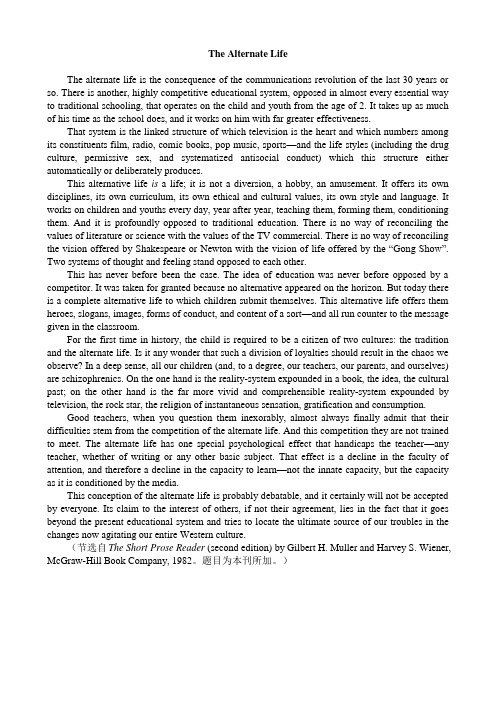
The Alternate LifeThe alternate life is the consequence of the communications revolution of the last 30 years or so. There is another, highly competitive educational system, opposed in almost every essential way to traditional schooling, that operates on the child and youth from the age of 2. It takes up as much of his time as the school does, and it works on him with far greater effectiveness.That system is the linked structure of which television is the heart and which numbers among its constituents film, radio, comic books, pop music, sports—and the life styles (including the drug culture, permissive sex, and systematized antisocial conduct) which this structure either automatically or deliberately produces.This alternative life is a life; it is not a diversion, a hobby, an amusement. It offers its own disciplines, its own curriculum, its own ethical and cultural values, its own style and language. It works on children and youths every day, year after year, teaching them, forming them, conditioning them. And it is profoundly opposed to traditional education. There is no way of reconciling the values of literature or science with the values of the TV commercial. There is no way of reconciling the vision offered by Shakespeare or Newton with the vision of life offered by the “Gong Show”. Two systems of thought and feeling stand opposed to each other.This has never before been the case. The idea of education was never before opposed by a competitor. It was taken for granted because no alternative appeared on the horizon. But today there is a complete alternative life to which children submit themselves. This alternative life offers them heroes, slogans, images, forms of conduct, and content of a sort—and all run counter to the message given in the classroom.For the first time in history, the child is required to be a citizen of two cultures: the tradition and the alternate life. Is it any wonder that such a division of loyalties should result in the chaos we observe? In a deep sense, all our children (and, to a degree, our teachers, our parents, and ourselves) are schizophrenics. On the one hand is the reality-system expounded in a book, the idea, the cultural past; on the other hand is the far more vivid and comprehensible reality-system expounded by television, the rock star, the religion of instantaneous sensation, gratification and consumption.Good teachers, when you question them inexorably, almost always finally admit that their difficulties stem from the competition of the alternate life. And this competition they are not trained to meet. The alternate life has one special psychological effect that handicaps the teacher—any teacher, whether of writing or any other basic subject. That effect is a decline in the faculty of attention, and therefore a decline in the capacity to learn—not the innate capacity, but the capacity as it is conditioned by the media.This conception of the alternate life is probably debatable, and it certainly will not be accepted by everyone. Its claim to the interest of others, if not their agreement, lies in the fact that it goes beyond the present educational system and tries to locate the ultimate source of our troubles in the changes now agitating our entire Western culture.(节选自The Short Prose Reader (second edition) by Gilbert H. Muller and Harvey S. Wiener, McGraw-Hill Book Company, 1982。
2021韩素音英译汉译文
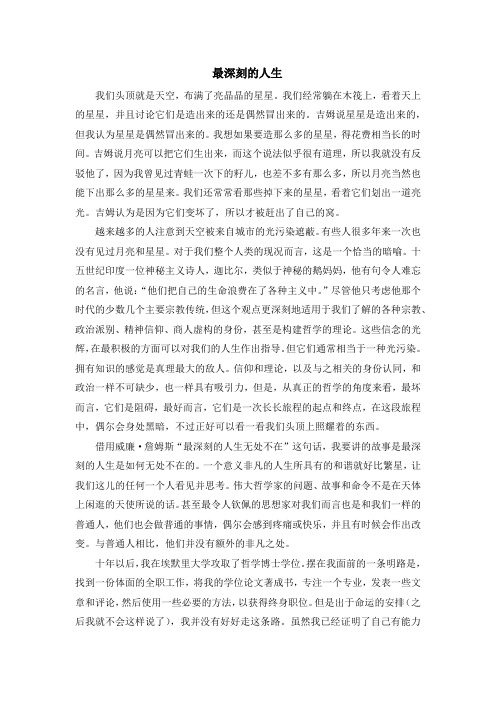
最深刻的人生我们头顶就是天空,布满了亮晶晶的星星。
我们经常躺在木筏上,看着天上的星星,并且讨论它们是造出来的还是偶然冒出来的。
吉姆说星星是造出来的,但我认为星星是偶然冒出来的。
我想如果要造那么多的星星,得花费相当长的时间。
吉姆说月亮可以把它们生出来,而这个说法似乎很有道理,所以我就没有反驳他了,因为我曾见过青蛙一次下的籽儿,也差不多有那么多,所以月亮当然也能下出那么多的星星来。
我们还常常看那些掉下来的星星,看着它们划出一道亮光。
吉姆认为是因为它们变坏了,所以才被赶出了自己的窝。
越来越多的人注意到天空被来自城市的光污染遮蔽。
有些人很多年来一次也没有见过月亮和星星。
对于我们整个人类的现况而言,这是一个恰当的暗喻。
十五世纪印度一位神秘主义诗人,迦比尔,类似于神秘的鹅妈妈,他有句令人难忘的名言,他说:“他们把自己的生命浪费在了各种主义中。
”尽管他只考虑他那个时代的少数几个主要宗教传统,但这个观点更深刻地适用于我们了解的各种宗教、政治派别、精神信仰、商人虚构的身份,甚至是构建哲学的理论。
这些信念的光辉,在最积极的方面可以对我们的人生作出指导。
但它们通常相当于一种光污染。
拥有知识的感觉是真理最大的敌人。
信仰和理论,以及与之相关的身份认同,和政治一样不可缺少,也一样具有吸引力,但是,从真正的哲学的角度来看,最坏而言,它们是阻碍,最好而言,它们是一次长长旅程的起点和终点,在这段旅程中,偶尔会身处黑暗,不过正好可以看一看我们头顶上照耀着的东西。
借用威廉·詹姆斯“最深刻的人生无处不在”这句话,我要讲的故事是最深刻的人生是如何无处不在的。
一个意义非凡的人生所具有的和谐就好比繁星,让我们这儿的任何一个人看见并思考。
伟大哲学家的问题、故事和命令不是在天体上闲逛的天使所说的话。
甚至最令人钦佩的思想家对我们而言也是和我们一样的普通人,他们也会做普通的事情,偶尔会感到疼痛或快乐,并且有时候会作出改变。
与普通人相比,他们并没有额外的非凡之处。
韩素音翻译大赛英译汉
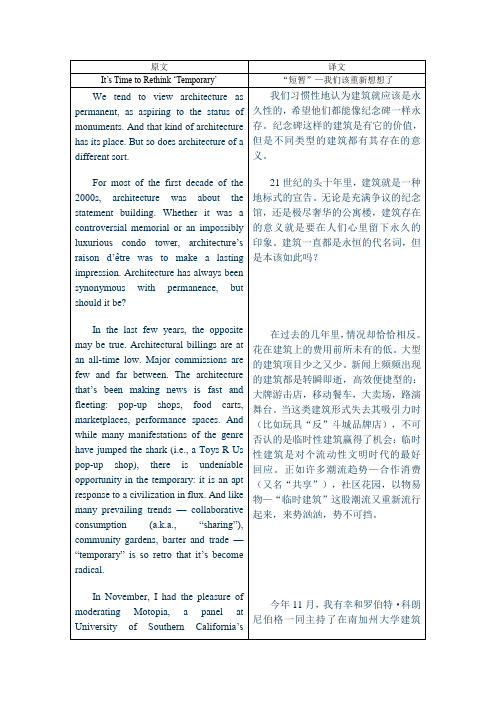
原文
译文
It’s Time to Rethink ‘Temporary’
“短暂”—我们该重新想想了
We tend to view architecture as permanent, as aspiring to the status of monuments. And that kind of architecture has its place. But so does architecture of a different sort.
In November, I had the pleasure of moderatingMSouthern California’sSchool of Architecture, with Robert Kronenburg, an architect, professor at University of Liverpool and portable/temporary/mobile guru. Author of a shelf full of books on the topic, including “Flexible: Architecture that Responds to Change,” “Portable Architecture: Design and Technology” and “Houses in Motion: The Genesis,” Kronenburg is a man obsessed.
韩素音英译汉原文
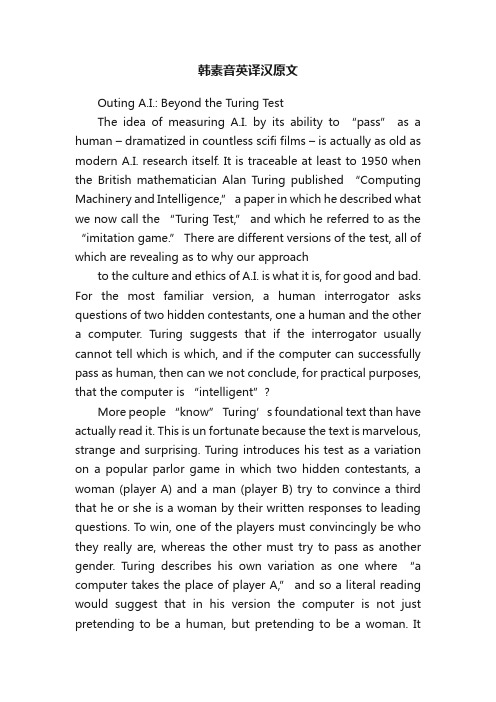
韩素音英译汉原文Outing A.I.: Beyond the Turing TestThe idea of measuring A.I. by its ability to “pass” as a human – dramatized in countless scifi films – is actually as old as modern A.I. research itself. It is traceable at least to 1950 when the British mathematician Alan Turing published “Computing Machinery and Intelligence,” a paper in which he described what we now call the “Turing Test,” and which he referred to as the “imitation game.” There are different versions of the test, all of which are revealing as to why our approachto the culture and ethics of A.I. is what it is, for good and bad. For the most familiar version, a human interrogator asks questions of two hidden contestants, one a human and the other a computer. Turing suggests that if the interrogator usually cannot tell which is which, and if the computer can successfully pass as human, then can we not conclude, for practical purposes, that the computer is “intelligent”?Mor e people “know” Turing’s foundational text than have actually read it. This is un fortunate because the text is marvelous, strange and surprising. Turing introduces his test as a variation on a popular parlor game in which two hidden contestants, a woman (player A) and a man (player B) try to convince a third that he or she is a woman by their written responses to leading questions. To win, one of the players must convincingly be who they really are, whereas the other must try to pass as another gender. Tur ing describes his own variation as one where “a computer takes the place of player A,” and so a literal reading would suggest that in his version the computer is not just pretending to be a human, but pretending to be a woman. Itmust pass as a she.Passing as a person comes down to what others see and interpret. Because everyone else is already willing to read others according to conventional cues (of race, sex, gender, species, etc.) the complicity between whoever (or whatever) is passing and those among which he or she or it performs is what allows passing to succeed. Whether or not an A.I. is trying to pass as a human or is merely in drag as a human is another matter. Is the ruse all just a game or, as for some people who are compelled to pass in their daily lives, an essential camouflage? Either way, “passing” may say more about the audience than about the performers.That we would wish to define the very existence of A.I. in relation to its ability to mimic how humans think that humans think will be looked back upon as a weird sort of speciesism. The legacy of that conceit helped to steer some older A.I. research down disappointingly fruitless paths, hoping to recreate human minds from available parts. It just doesn’t work that way. ContemporaryA.I. research suggests instead that the threshold by which any particular arrangement of matter can be said to be “intelligent” doesn’t have much to do with how it reflects humanness back at us. As Stuart Russell and Peter Norvig (now director of research at Google) suggest in their essential A.I. textbook, biomorphic imitation is not how we design complex technology. Airplanes don’t fly like birds fly, and we certainly don’t try to trick birds into thinking that airplanes are birds in order to test whether those p lanes “really” are flying machines. Why do it for A.I. then? Today’s serious A.I. research does not focus on the Turing Test as an objective criterion of success, andyet in our popular culture of A.I., the test’s anthropocentrism holds such durable conceptual importance. Like the animals who talk like teenagers in a Disney movie, other minds are conceivable mostly by way of puerile ventriloquism.Where is the real injury in this? If we want everyday A.I. to be congenial in a humane sort of way, so what? The answer is that we have much to gain from a more sincere and disenchanted relationship to synthetic intelligences, and much to lose by keeping illusions on life support. Some philosophers write about the possible ethical “rights” of A.I. as sentient entit ies, but that’s not my point here. Rather, the truer perspective is also the better one for us as thinking technical creatures.Musk, Gates and Hawking made headlines by speaking to the dangers that A.I. may pose. Their points are important, but I fear were largely misunderstood by many readers. Relying on efforts to program A.I. not to “harm humans” (inspired by Isaac Asimov’s “three laws” of robotics from 1942) makes sense only when an A.I. knows what humans are and what harming them might mean. There are many ways that an A.I. might harm us that have nothing to do with its malevolence toward us, and chief among these is exactly following our well-meaning instructions to an idiotic and catastrophic extreme. Instead of mechanical failure or a transgression of moral code, the A.I. may pose an existential risk because it is both powerfully intelligent and disinterested in humans. T o the extent that we recognize A.I. by its anthropomorphic qualities, or presume its preoccupation with us, we are vulnerable to those eventualities.Whether or not “hard A.I.” ever appears, the harm is al so in the loss of all that we prevent ourselves from discovering and understanding when we insist on protecting beliefs we know tobe false. In the 1950 essay, Turing offers several rebuttals to his speculative A.I., including a striking comparison with earlier objections to Copernican astronomy. Copernican traumas that abolish the false centrality and absolute specialness of human thought and species-being are pricelessaccomplishments. They allow for human culture based on how the world actually is more than on how it appears to us from our limited vantage point. Turing referred to these as “theological objections,” but one could argue that the anthropomorphic precondition for A.I. is a“pre-Copernican” attitude as well, however secular it may appear. The advent of robust inhuman A.I. may let us achieve another disenchantment, one that should enable a more reality-based understanding of ourselves, our situation, and a fuller and more complex understanding of what “intelligence” is and is not. From there we can hopefully make our world with a greater confidence that our models are good approximations of what’s out there.。
韩素音翻译原文(1)
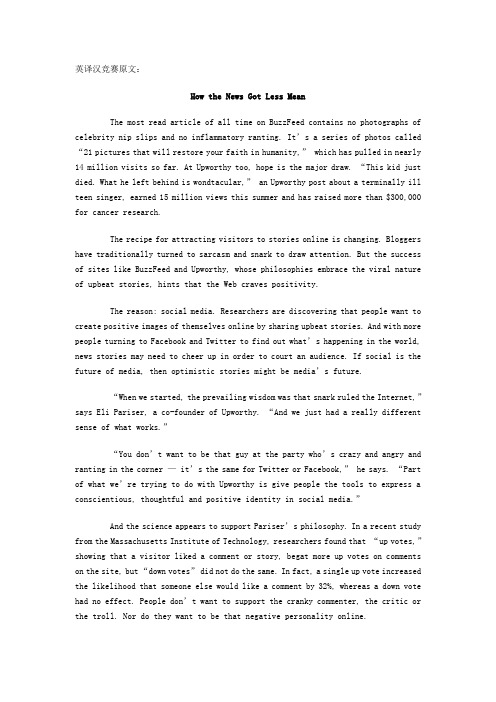
英译汉竞赛原文:How the News Got Less MeanThe most read article of all time on BuzzFeed contains no photographs of celebrity nip slips and no inflammatory ranting. It’s a series of photos called “21 pictures that will restore your faith in humanity,” which has pulled in nearly 14 million visits so far. At Upworthy too, hope is the major draw. “This kid just died. What he left behind is wondtacular,” an Upworthy post about a terminally ill teen singer, earned 15 million views this summer and has raised more than $300,000 for cancer research.The recipe for attracting visitors to stories online is changing. Bloggers have traditionally turned to sarcasm and snark to draw attention. But the success of sites like BuzzFeed and Upworthy, whose philosophies embrace the viral nature of upbeat stories, hints that the Web craves positivity.The reason: social media. Researchers are discovering that people want to create positive images of themselves online by sharing upbeat stories. And with more people turning to Facebook and Twitter to find out what’s happening in the world, news stories may need to cheer up in order to court an audience. If social is the future of media, then optimistic stories might be media’s future.“When we started, the prevailing wisdom was that snark ruled the Internet,”says Eli Pariser, a co-founder of Upworthy. “And we just had a really different sense of what works.”“You don’t want to be that guy at the party who’s crazy and angry and ranting in the corner — it’s the same for Twitter or Facebook,” he says. “Part of what we’re trying to do with Upworthy is give people the tools to express a conscientious, thoughtful and positive identity in social media.”And the science appears to support Pariser’s philosophy. In a recent study from the Massachusetts Institute of Technology, researchers found that “up votes,”showing that a visitor liked a comment or story, begat more up votes on comments on the site, but “down votes” did not do the same. In fact, a single up vote increased the likelihood that someone else would like a comment by 32%, whereas a down vote had no effect. People don’t want to support the cranky commenter, the critic or the troll. Nor do they want to be that negative personality online.In another study published in 2012, Jonah Berger, author of Contagious: Why Things Catch On and professor of marketing at the Wharton School of the University of Pennsylvania, monitored the most e-mailed stories produced by the New York Times for six months and found that positive stories were more likely to make the list than negative ones.“What we share [or like] is almost like the car we drive or the clothes we wear,”he says. “It says something about us to other people. So people would much rather be seen as a Positive Polly than a Debbie Downer.”It’s not always that simple: Berger says that though positive pieces drew more traffic than negative ones, within the categories of positive and negative stories, those articles that elicited more emotion always led to more shares.“Take two negative emotions, for example: anger and sadness,” Berger says. “Both of those emotions would make the reader feel bad. But anger, a high arousal emotion, leads to more sharing, whereas sadness, a low arousal emotion, doesn’t. The same is true of the positive side: excitement and humor increase sharing, whereas contentment decreases sharing.”And while some popular BuzzFeed posts — like the recent “Is this the most embarrassing interview Fox News has ever done?”— might do their best to elicit shares through anger, both BuzzFeed and Upworthy recognize that their main success lies in creating positive viral material.“It’s not that people don’t share negative stories,” says Jack Shepherd, editorial director at BuzzFeed. “It just means that there’s a higher potential for positive stories to do well.”Upworthy’s mission is to highlight serious issues but in a hopeful way, encouraging readers to donate money, join organizations and take action. The strategy seems to be working: barely two years after its launch date (in March 2012), the site now boasts 30 million unique visitors per month, according to Upworthy. The site’s average monthly unique visitors grew to 14 million people over its first six quarters — to put that in perspective, the Huffington Post had only about 2 million visitors in its first six quarters online.But Upworthy measures the success of a story not just by hits. The creators of the site only consider a post a success if it’s also shared frequently on social media. “We are interested in content that people want to share partly for pragmaticreasons,” Pariser says. “If you don’t have a good theory about how to appear in Facebook and Twitter, then you may disappear.”Nobody has mastered the ability to make a story go viral like BuzzFeed. The site, which began in 2006 as a lab to figure out what people share online, has used what it’s learned to draw 60 million monthly unique visitors, according to BuzzFeed. (Most of that traffic comes from social-networking sites, driving readers toward BuzzFeed’s mix of cute animal photos and hard news.) By comparison the New York Times website, one of the most popular newspaper sites on the Web, courts only 29 million unique visitors each month, according to the Times.BuzzFeed editors have found that people do still read negative or critical stories, they just aren’t the posts they share with their friends. And those shareable posts are the ones that newsrooms increasingly prize.“Anecdotally, I can tell you people are just as likely to click on negative stories as they are to click on positive ones,” says Shepherd. “But they’re more likely to share positive stories. What you’re interested in is different from what you want your friends to see what you’re interested in.”So as newsrooms re-evaluate how they can draw readers and elicit more shares on Twitter and Facebook, they may look to BuzzFeed’s and Upworthy’s happiness model for direction.“I think that the Web is only becoming more social,” Shepherd says. “We’re at a point where readers are your publishers. If news sites aren’t thinking about what it would mean for someone to share a story on social media, that could be detrimental.”汉译英竞赛原文:城市的迷失沿着瑗珲—腾冲线,这条1935年由胡焕庸先生发现并命名的中国人口、自然和历史地理的分界线,我们看到,从远距离贸易发展开始的那天起,利益和权力的渗透与分散,已经从根本结构上改变了城市的状态:城市在膨胀,人在疏离。
第四届‘海伦 斯诺’杯翻译大赛 汉译英
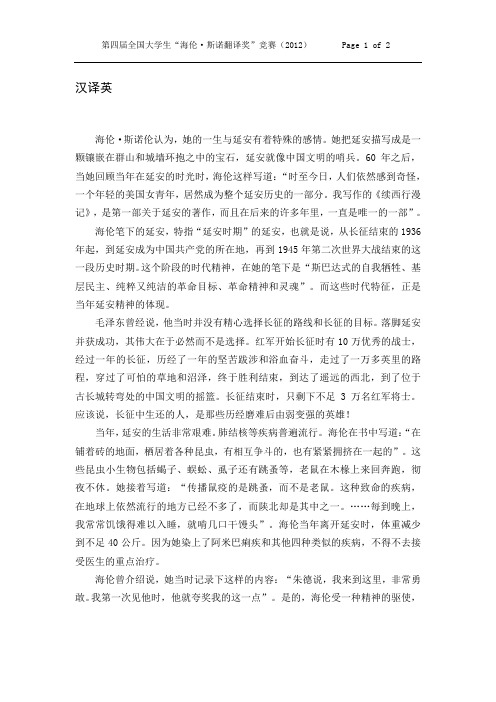
汉译英海伦·斯诺伦认为,她的一生与延安有着特殊的感情。
她把延安描写成是一颗镶嵌在群山和城墙环抱之中的宝石,延安就像中国文明的哨兵。
60年之后,当她回顾当年在延安的时光时,海伦这样写道:“时至今日,人们依然感到奇怪,一个年轻的美国女青年,居然成为整个延安历史的一部分。
我写作的《续西行漫记》,是第一部关于延安的著作,而且在后来的许多年里,一直是唯一的一部”。
海伦笔下的延安,特指“延安时期”的延安,也就是说,从长征结束的1936年起,到延安成为中国共产党的所在地,再到1945年第二次世界大战结束的这一段历史时期。
这个阶段的时代精神,在她的笔下是“斯巴达式的自我牺牲、基层民主、纯粹又纯洁的革命目标、革命精神和灵魂”。
而这些时代特征,正是当年延安精神的体现。
毛泽东曾经说,他当时并没有精心选择长征的路线和长征的目标。
落脚延安并获成功,其伟大在于必然而不是选择。
红军开始长征时有10万优秀的战士,经过一年的长征,历经了一年的坚苦跋涉和浴血奋斗,走过了一万多英里的路程,穿过了可怕的草地和沼泽,终于胜利结束,到达了遥远的西北,到了位于古长城转弯处的中国文明的摇篮。
长征结束时,只剩下不足3万名红军将士。
应该说,长征中生还的人,是那些历经磨难后由弱变强的英雄!当年,延安的生活非常艰难。
肺结核等疾病普遍流行。
海伦在书中写道:“在铺着砖的地面,栖居着各种昆虫,有相互争斗的,也有紧紧拥挤在一起的”。
这些昆虫小生物包括蝎子、蜈蚣、虱子还有跳蚤等,老鼠在木椽上来回奔跑,彻夜不休。
她接着写道:“传播鼠疫的是跳蚤,而不是老鼠。
这种致命的疾病,在地球上依然流行的地方已经不多了,而陕北却是其中之一。
……每到晚上,我常常饥饿得难以入睡,就啃几口干馒头”。
海伦当年离开延安时,体重减少到不足40公斤。
因为她染上了阿米巴痢疾和其他四种类似的疾病,不得不去接受医生的重点治疗。
海伦曾介绍说,她当时记录下这样的内容:“朱德说,我来到这里,非常勇敢。
第3届韩素音青年翻译比赛英译汉原文及参考译文

The Colour of the SkyAlfred Russel WallaceIf we look at the sky on a perfectly fine summer’s day we shall find that the blue colour is the most pure and intense overhead, and when looking high up in a direction opposite to the sun. Near the horizon it is always less bright, while in the region immediately around the sun it is more or less yellow. The reason of this is that near the horizon we look through a very great thickness of the lower atmosphere, which is full of the larger dust particles reflecting white light, and this dilutes the pure blue of the higher atmosphere seen beyond. And in the vicinity of the sun a good deal of the blue light is reflected back into space by the finer dust, thus giving a yellowish tinge to that which reaches us reflected chiefly from the coarse dust of the lower atmosphere. At sunset and sunrise, however, this last effect is greatly intensified, owing to the great thickness of the strata of air through which the light reaches us. The enormous amount of this dust is well shown by the fact that then only we can look full at the sun, even when the whole sky is free from clouds and there is no apparent mist. But the sun’s rays then reach us after having passed, first, though an enormous thickness of the higher strata of the air, the minute dust of which reflects most of the blue rays away from us, leaving the complementary yellow light to pass on. Then, thesomewhat coarser dust reflects the green rays, leaving a more orange-coloured light to pass on; and finally some of the yellow is reflected, leaving almost pure red. But owing to the constant presence of air currents, arranging both the dust and vapour in strata of varying extent and density, and of high or low clouds which both absorb and reflect the light in varying degrees, we see produced all those wondrous combinations of tints and those gorgeous ever-changing colours which are a constant source of admiration and delight to all who have the advantage of an uninterrupted view to the west and who are accustomed to watch for those not infrequent exhibitions of nature’s kaleidoscopic colour painting. With every change in the altitude of the sun the display changes its character; and most of all when it has sunk below the horizon, and owing to the more favourable angles a larger quantity of the coloured light is reflected toward us. Especially when there is a certain amount of cloud is this the case. These, so long as the sun was above the horizon, intercepted much of the light and colour; but when the great luminary has passed away from our direct vision, his light shines more directly on the under sides of all the clouds and air strata of different densities; a new and more brilliant light flushes the western sky, and a display of gorgeous ever-changing tints occurswhich are at once the delight of the beholder and the despair of the artist. And all this unsurpassable glory we owe to—dust!译文:天空的色彩晴空万里的夏日,如果我们观察一下天空,且背向太阳,极目仰望,就会发现头顶上空的蓝色最纯净,最浓郁。
韩素音英译汉原文教学文稿

韩素音英译汉原文Outing A.I.: Beyond the Turing TestThe idea of measuring A.I. by its ability to “pass” as a human – dramatized in countless scifi films – is actually as old as modern A.I. research itself. It is traceable at least to 1950 when the British ma thematician Alan Turing published “Computing Machinery and Intelligence,” a paper in which he described what we now call the “Turing Test,” and which he referred to as the “imitation game.” There are different versions of the test, all of which are revealing as to why our approach to the culture and ethics of A.I. is what it is, for good and bad. For the most familiar version, a human interrogator asks questions of two hidden contestants, one a human and the other a computer. Turing suggests that if the interrogator usually cannot tell which is which, and if the computer can successfully pass as human, then can we not conclude, for practical purposes, that the computer is “intelligent”?More people “know” Turing’s foundational text than have actually read it. This is unfortunate because the text is marvelous, strange and surprising. Turing introduces his test as a variation on a popular parlor game in which two hidden contestants, a woman (player A) and a man (player B) try to convince a third that he or she is a woman by their written responses to leading questions. To win, one of the players must convincingly be who they really are, whereas the other must try to pass as another gender. Turing describes his own variation as one where “a computer takes the pla ce of player A,” and so a literal reading would suggest that in his version the computer is not just pretending to be a human, but pretending to be a woman. It must pass as a she.Passing as a person comes down to what others see and interpret. Because everyone else is already willing to read others according to conventional cues (of race, sex, gender, species, etc.) the complicity between whoever (or whatever) is passing and those among which he or she or it performs is what allows passing to succeed. Whether or not an A.I. is trying to pass as a human or is merely in drag as a human is another matter. Is the ruse all just a game or, as for some people who are compelled to pass in their daily lives, an essential camouflage? Either way, “passing” may say mo re about the audience than about the performers.That we would wish to define the very existence of A.I. in relation to its ability to mimic how humans think that humans think will be looked back upon as a weird sort of speciesism. The legacy of that conceit helped to steer some older A.I. research down disappointingly fruitless paths, hoping to recreate human minds from available parts. It just doesn’t work that way. Contemporary A.I. research suggests instead that the threshold by which any particular arrangement of matter can be said to be “intelligent” doesn’t have much to do with how it reflects humanness back at us. As Stuart Russell and Peter Norvig (now director of research at Google) suggest in their essential A.I. textbook, biomorphic imitation is not how we design complex technology. Airplanes don’t fly like birds fly, and we certainly don’t try to trick birds into thinking that airplanes are birds in order to test whether those planes “really” are flying machines. Why do it for A.I. then? Today’s serious A.I. research does not focus on the Turing Test as an objective criterion of success, and yet in our popular culture of A.I., the test’s anthropocentrism holds such durable conceptual importance. Like the animals who talk like teenagers in a Disney movie, other minds are conceivable mostly by way of puerile ventriloquism.Where is the real injury in this? If we want everyday A.I. to be congenial in a humane sort of way, so what? The answer is that we have much to gain from a more sincere and disenchanted relationship to synthetic intelligences, and much to lose by keeping illusions on life support. Some philosophers write about the possible ethical “rights” of A.I. as sentient entities, but that’s not my point here. Rather, the truer perspective is also the better one for us as thinking technical creatures.Musk, Gates and Hawking made headlines by speaking to the dangers that A.I. may pose. Their points are important, but I fear were largely misunderstood by many readers. Relying on efforts to program A.I. not to “harm humans” (inspired by Isaac Asimov’s “three laws” of robotics from 1942) makes sense only when an A.I. knows what humans are and what harming them might mean. There are many ways that an A.I. might harm us that have nothing to do with its malevolence toward us, and chief among these is exactly following our well-meaning instructions to an idiotic and catastrophic extreme. Instead of mechanical failure or a transgression of moral code,the A.I. may pose an existential risk because it is both powerfully intelligent and disinterested in humans. To the extent that we recognize A.I. by its anthropomorphic qualities, or presume its preoccupation with us, we are vulnerable to those eventualities.Whether or not “hard A.I.” ever appears, th e harm is also in the loss of all that we prevent ourselves from discovering and understanding when we insist on protecting beliefs we know to be false. In the 1950 essay, Turing offers several rebuttals to his speculative A.I., including a striking comparison with earlier objections to Copernican astronomy. Copernican traumas that abolish the false centrality and absolute specialness of human thought and species-being are priceless accomplishments. They allow for human culture based on how the world actually is more than on how it appears to us from our limited vantage point. Turing referred to these as “theological objections,” but one could argue that the anthropomorphic precondition for A.I. is a “pre-Copernican” attitude as well, however secular it may appear. The advent of robust inhuman A.I. may let us achieve another disenchantment, one that should enable a more reality-based understanding of ourselves, our situation, and a fuller and more complex understanding of what “intelligence” is and is not. From there we can hopefully make our world with a greater confidence that our models are good approximations of what’s out there.。
韩素音青年翻译

英译汉竞赛原文:The Posteverything GenerationI never expected to gain any new insight into the nature我从未想过要对我们这一代人的本质,of my generation, or the changing landscape of American 或者说在美国大学变化中的风景,colleges, in Lit Theory. Lit Theory is supposed to be the class 在理论上获得任何新的见解。
文学理论应该是where you sit at the back of the room with every other jaded 你和其他穿着sophomore wearing skinny jeans, thick-framed glasses, an 紧身牛仔裤和一件夸张的T恤,带着厚框眼镜和ironic tee-shirt and over-sized retro headphones, just waiting 超大号的复古耳机的疲惫不堪的学生们坐在教室的后排,等待for lecture to be over so you can light up a Turkish Gold and着讲座结束,然后你可以点亮一根土耳其黄金,walk to lunch while listening to Wilco. That’s pretty much 听着Wilco去吃中饭。
这也是the way I spent the course, too: through structuralism,我度过课程最好的方式:通过结构主义,formalism, gender theory, and post-colonialism, I was far too 形式主义,性别理论,后殖民主义,我相当busy shuffling through my Ipod to see what the patriarchal world 忙碌的通过我的iPod看资本主义order of capitalist oppression had to do with Ethan Frome. But 压迫的男权世界秩序跟伊坦。
第5届韩素音青年翻译比赛英译汉原文及参考译文
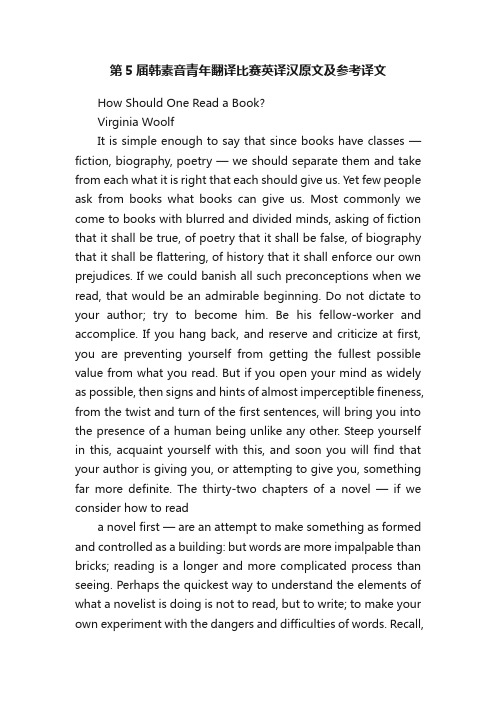
第5届韩素音青年翻译比赛英译汉原文及参考译文How Should One Read a Book?Virginia WoolfIt is simple enough to say that since books have classes —fiction, biography, poetry — we should separate them and take from each what it is right that each should give us. Yet few people ask from books what books can give us. Most commonly we come to books with blurred and divided minds, asking of fiction that it shall be true, of poetry that it shall be false, of biography that it shall be flattering, of history that it shall enforce our own prejudices. If we could banish all such preconceptions when we read, that would be an admirable beginning. Do not dictate to your author; try to become him. Be his fellow-worker and accomplice. If you hang back, and reserve and criticize at first, you are preventing yourself from getting the fullest possible value from what you read. But if you open your mind as widely as possible, then signs and hints of almost imperceptible fineness, from the twist and turn of the first sentences, will bring you into the presence of a human being unlike any other. Steep yourself in this, acquaint yourself with this, and soon you will find that your author is giving you, or attempting to give you, something far more definite. The thirty-two chapters of a novel —if we consider how to reada novel first — are an attempt to make something as formed and controlled as a building: but words are more impalpable than bricks; reading is a longer and more complicated process than seeing. Perhaps the quickest way to understand the elements of what a novelist is doing is not to read, but to write; to make your own experiment with the dangers and difficulties of words. Recall,then, some event that has left a distinct impression on you —how at the corner of the street, perhaps, you passed two people talking. A tree shook; an electric light danced; the tone of the talk was comic, but also tragic; a whole vision, an entire conception, seemed contained in that moment.But when you attempt to reconstruct it in words, you will find that it breaks into a thousand conflicting impressions. Some must be subdued; others emphasized; in the process you will lose, probably all grasp upon the emotion itself. Then turn from your blurred and littered pages to the opening pages of some great novelist —Defoe, Jane Austen, Hardy. Now you will be better able to appreciate their mastery. It is not merely that we are in the presence of a different person —Defoe, Jane Austen, or Thomas Hardy — but that we are living in a different world. Here, in Robinson Crusoe, we are trudging a plain high road; one thing happens after another; the fact and the order of the fact is enough. But if the open air and adventure mean everything to Defoe they mean nothing to Jane Austen. Hers is the drawing-room, and people talking,and by the many mirrors of their talk revealing their characters. And if, when we have accustomed ourselves to the drawing-room and its reflections, we turn to Hardy, we are once more spun around. The moors are round us and the stars above our heads. The other side of the mind is now exposed — the dark side that comes uppermost in solitude, not the light side that shows in company. Our relations are not towards people, but towards Nature and destiny. Yet different as these worlds are, each is consistent with itself. The maker of each is careful to observe the laws of his own perspective,and however great a strain they may put upon us they will never confuse us, as lesser writers so frequently do, by introducing two differentkinds of reality into the same book. Thus to go from one great novelist to another — from Jane Austen to Hardy, from Peakcok to Trollope, from Scott to Meredith —is to be wrenched and uprooted; to be thrown this way and then that. To read a novel is a difficult and complex art. You must be capable not only of great finesse of perception, but of great boldness of imagination if you are going to make use of all that the novelist — the great artist — gives you.怎样读书?弗吉尼亚·伍尔夫书既然有小说,传记,诗歌之分,就应区别对待,从各类书中取其应该给及我们的东西。
- 1、下载文档前请自行甄别文档内容的完整性,平台不提供额外的编辑、内容补充、找答案等附加服务。
- 2、"仅部分预览"的文档,不可在线预览部分如存在完整性等问题,可反馈申请退款(可完整预览的文档不适用该条件!)。
- 3、如文档侵犯您的权益,请联系客服反馈,我们会尽快为您处理(人工客服工作时间:9:00-18:30)。
The BlanketFloyd DellPetey hadn’t really believed that Dad would be doing it—sending Granddad away. “Away” was what they were calling it. Not until now could he believe it of Dad.But here was the blanket that Dad had that day bought for him, and in the morning he’d be going away. And this was the last evening they’d be having together. Dad was off seeing that girl he was to marry. He’d not be back till late, and they could sit up and talk.It was a fine September night, with a silver moon riding high over the gully. When they’d washed up the supper dishes they went out on the shanty porch, the old man and the bit of a boy, taking their chairs. “I’ll get me fiddle,” said the old man, “and play ye some of the old tunes.” But instead of the fiddle he brought out the blanket. It was a big, double blanket, red, with black cross stripes.“Now, isn’t that a fine blanket!” said the old man, smoothing it over his knees. “And isn’t your father a kind man to be giving the old fellow a blanket like that to go away with? It cost something, it did—look at the wool of it! And warm it will be these cold winter nights to come. There’ll be few blankets there the equal of this one!”It was like Granddad to be saying that. He was trying to make it easier. He’d pretended all along it was he that wanting to go away to the great brick building—the government place, where he’d be with so many other old fellows having the best of everything.... But Petey hadn’t believed Dad would really do it, until this night when he brought home the blanket.“Oh, yes, it’s a fine blanket,” said Petey, and got up and went into the shanty. He wasn’t the kind to cry, and, besides, he was too old for that, being eleven. He’d just come in to fetch Granddad’s fiddle.The blanket slid to the floor as the old man took the fiddle and stood up. It was the last night they’d be having together. There wasn’t any need to say, “Play all the old tunes.” Granddad tuned up for a minute, and then said, “This is one you’ll like to remember.”The silver moon was high overhead, and there was a gentle breeze playing down the gully. He’d never be hearing Granddad play like this again. It was as well Dad was moving into that new house, away from here. He’d not want, Petey wouldn’t, to sit here on the old porch of fine evenings, with Granddad gone.The tune changed. “Here’s something gayer.” Petey sat and stared out over the gully. Dad would marry that girl. Yes, that girl who’d kissed him and slobbered over him, saying she’d try to be agood mother to him, and all.... His chair creaked as he involuntarily gave his body a painful twist.The tune stopped suddenly, and Granddad said: “It’s a poor tune, except to be dancing to.” And then: “It’s a fine girl your father’s going to marry. He’ll be feeling young again, with a pretty wife like that. And what would an old fellow like me be doing around their house, getting in the way, an old nuisance, what with my talk of aches and pains! And then there’ll be babies coming, and I’d not want to be there to hear them crying at all hours. It’s best that I take myself off, like I’m doing. One more tune or two, and then we’ll be going to bed to get some sleep against the morning, when I’ll pack up my fine blanket and take my leave. Listen to this, will you? It’s a bit sad, but a fine tune for a night like this.”They didn’t hear the two people coming down the gully path, Dad and the pretty girl with the hard, bright face like a china doll’s. but they heard her laugh, right by the porch, and the tune stopped on a wrong, high, startled note. Dad didn’t say anything, but the girl came forward and spoke to Granddad prettily: “I’ll not be seeing you leave in the morning, so I came over to say good-by.”“It’s kind of you,” said Granddad, with his eyes cast down; and then, seeing the blanket at his feet, he stopped to pick it up. “Andwill you look at this,” he said in embarrassment, “the fine blanket my son has given me to go away with!”“Yes,” she said, “it’s a fine blanket.” She felt of the wool, and repeated in surprise, “A fine blanket—I’ll say it is!” She turned to Dad, and said to him coldly, “it cost something, that.”He cleared his throat, and said defensively, “I wanted him to have the best...”The girl stood there, still intent on the blanket. “It’s double, too,” she said reproachfully to Dad.“Yes,” said Granddad, “it’s double—a fine blanket for an old fellow to be going away with.”The boy went abruptly into the shanty. He was looking for something. He could hear that girl reproaching Dad, and Dad becoming angry in his slow way. And now she was suddenly going away in a huff.... As Petey came out, she turned and called back, “All the same, he doesn’t need a double blanket!” And she ran up the gully path.Dad was looking after her uncertainly.“Oh, she’s right,” said the boy coldly. “Here, Dad”—and he held out a pair of scissors. “Cut the blanket in two.”Both of them stared at the boy, startled. “Cut it in two, I tell you, Dad!” he cried out. “And keep the other half!”“That’s not a bad idea,” said Granddad gently. “I don’t need so much of a blanket.”“Yes,” said the boy harshly, “a single blanket is enough for an old man when he’s sent away. We’ll save the other half, Dad; it will come in handy later.”“Now, what do you mean by that?” asked Dad.“I mean,” said the boy slowly,” that I’ll give it to you, Dad—when you’re old and I’m sending you—away.”There was a silence, and then Dad went over to Granddad and stood before him, not speaking. But Granddad understood, for he put out a hand and laid it on Dad’s shoulder. Petey was watching them. And he heard Granddad whisper, “It’s all right, son—I knew you didn’t mean it....” And then Petey cried.But it didn’t matter—because they were all three crying together.译文:一床双人毛毯(美)弗罗伊德•戴尔晴朗的九月的夜晚,银色的月光洒落在溪谷上。
